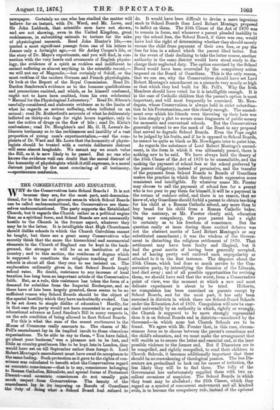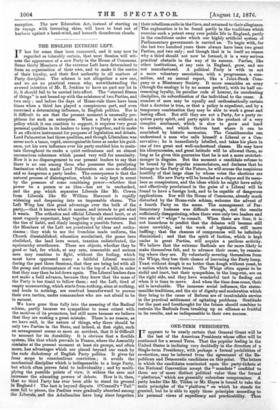THE CONSERVATIVES AND EDUCATION.
WHY do the Conservatives hate School Boards It is not because they are, for the most part, anti-denomina- tional, for in the lax and general sense in which School Boards can be called undenorainational, the Conservatives are them- selves undenominational. The party supports the Established Church, but it regards the Church rather as a political engine than as a spiritual force, and School Boards are not necessarily hostile to the Church in the former aspect, whatever they may be in the latter. It is intelligible that High Churchmen should dislike schools in which the Church Catechism cannot be taught, but there are a great many Conservatives who secretly think that the more the hierarchical and sacramental elements in the Church of England can be kept in the back- ground, the stronger it will be as an institution of the country ; and to this section, the residuum of dogma which is supposed to constitute the religious teaching of Board schools is about all that they care to see insisted on. The explanation ordinarily given is, that School Boards imply school rates. No doubt, resistance to any increase of local taxation has long been an important article of the Conservative faith. But, as a rule, this resistance has taken the form of a demand for subsidies from the Imperial Exchequer, and as these have of late been largely granted, there seems to be no sufficient reason why School Boards should be the object of the special hostility which they have undoubtedly evoked. Can it be set down to simple dislike of. education Hardly, for in that ease the party would not have consented to so great an educational advance as Lord Sandon's Bill in many respects is, on the sole condition of being allowed to flout School Boards. For this is what the sum of the recent excitement in the House of Commons really amounts to. The charm of Mr. Pell's amendment lay in its implied insult to these obnoxious organisations. To be able to say to them, "You have failed, go about your business," was a pleasure not to be lost, and little as country gentlemen like to be kept late in London, they would have sat on till September rather than forego it. Lord Robert Montagu's amendment must have owed its acceptance to the same feeling. Such protection as it gave to the rights of con- science was calculated to benefit what the Conservatives regard as eccentric consciences—that is to say, consciences belonging to Roman Catholics, Ritualists, and special forms of Protestant Dissent—and eccentric consciences do not usually gain much respect from Conservatives. The beauty of the amendment lay in its imnosing on Boards of Guardians the duty of doing what a School Board had refused to do. It would have been difficult to devise a more ingenious snub to School Boards than Lord Robert Montagu proposed to inflict on them. The 25th Clause of the Act of 1870 was to remain in force, and whenever a parent pleaded inability to pay the school fees, the School Board, if there was one, would have had the right of determining whether they should merely excuse the child from payment of their own fees, or pay the fees for him in a school which the parent liked better. But in the event of their declining to take the latter course, another authority in the same district would have stood ready to dis- charge their neglected duty. The option exercised by the School Board would have been overruled by the compulsory action imposed on the Board of Guardians. This is the only reason, that we can see, why the Conservatives should have set Lord Robert M.ontagu's amendment on a pinnacle very nearly as high as that which they had built for Mr. Pell's. Why the Irish Members should have voted for it is intelligible enough. It is in the case of Catholic children that the parent's option is most important, and will most frequently be exercised. Mr. New- degate, whose Conservatism is always held in strict subordina- tion to his Protestantism, saw this clearly enough. The amend- ment over which his-friends were throwing up their hats was to him simply a plot to secure some fragments of public money for monastic and conventual schools. But the Conservatives generally refused to see the mark of the Beast in any proposal that served to degrade School Boards. Even the Pope ought to be judged by his fruits and if he is opposed to School Boards, he cannot be quite so black as Mr. Newdegate tries to paint him. As regards the substance of Lord Robert Montagu's amend- ment, in the form in which it was ultimately passed, there is nothing new to be said. We have always held the theory of the 25th Clause of the Act of 1870 to be unassailable, and the making the payment of school fees at the school preferred by the parent obligatory, instead of permissive' and the transfer of the payment from School Boards to Boards of Guardians makes the practice in which the theory finds expression more consistent and intelligible. By whatever name Mr. Forster may choose to call the payment of school fees for a parent who is too poor to pay them for himself, it will be a payment in the nature of outdoor relief, and there is no reason, that we know of, why Guardians should forbid a parent to obtain teaching for his child at a Roman Catholic school, any more than to buy bread for his child from a Roman Catholic baker. On the contrary, as Mr. Forster clearly said, education being now compulsory, the poor parent had a right to certainty as to his freedom of conscience. But the question really at issue during these excited debates was not the abstract merits of Lord Robert Montagu's or any substituted amendment ; it was the wisdom of the Govern- ment in disturbing the religious settlement a 1870. That settlement may have been faulty and illogical, but it had the great merits of having been generally accepted, and of baying pretty well outlived such unpopularity as attached to it in the first instance. The disputes about the 25th Clause, which had done so much service to the Con- servative party, by intensifying the disunion of the Liberals, had died away ; and of all possible opportunities for reviviag them, we should have said that the worst, from a Conservative point of view, was the moment at which a new and most delicate experiment is about to be tried. Hitherto, no compulsion has been exercised ma parents except by School Boards, and for the most part, it has only been exercised in districts in which there are School-Board Schools under the Education Act of 1870. Compulsion will now be exer- cised universally by an authority in which, rightly or wrongly, the Church is supposed to be more strongly represented than it is on School Boards and in districts—numbered by the thousand—in which none but Chureh Schools are to be found. We agree with Mr. Forster that, in this case, circum- stances force us to choose between the parent's conscience and the child's education, and we must make the arrangement that will enable us to secure the latter and essential end, at the least possible violence to the former end. But if Dissenter are to be compelled, and rightly compelled, to send their children LO Church Schools, it becomes additionally important that there should be no reawakening of theological passion. The less Dis- senters are preinclined to look out for causes of irritation, the less likely they will be to find them. The folly of the Government has unfortunately supplied them with two ex- cellent occasions of sospicion. The School Boards in which they trust may be abolished ; the 25th Clause, which they regard as a symbol of concurrent endowment and all kindred evils, is to become the compulsory rule, instead of the optional exception. The new Education Act, instead of starting on its voyage with favouring skies, will have to beat out of harbour against a head-wind, and beneath thunderous clouds.































 Previous page
Previous page